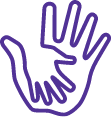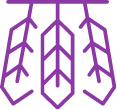Education
Paying for Post-Secondary School
What are my Options?
There are several ways that you can pay for your post-secondary journey: Tuition Waiver program, bursaries & scholarships, sponsorship, and Loans. Scroll down to learn about your options and check out our comprehensive scholarship guide for more opportunities.
Futures Forward Scholarship Guide (opens in a new window)
Tuition-Waiver Program
Ten colleges and universities in Manitoba provide bursaries to current and former youth in care. These bursaries can cover a substantial amount or the full cost of your tuition for an eligible degree, diploma, or certificate program. The number of available waivers depends on the school you want to apply to.
Please note that Waivers are not guaranteed, and Futures Forward does not make any decisions on who receives a Waiver. Futures Forward processes Tuition Waiver applications and sends them to the appropriate institutions for selection.
Tuition waiver students are also eligible for financial support that helps with living expenses, books, supplies, transportation and mandatory health and dental fees.
Eligibility
- You are a current or former youth in care in Manitoba (no age or care status restrictions).
- You have a letter proving that you have CFS care experience in Manitoba. If you need help getting this letter, contact Futures Forward’s Post-Secondary Advisor.
Note: there are no age restrictions on tuition waivers at all participating post-secondary schools.
Rules and Responsibilities
- Achieve a minimum of a 2.0 GPA.
- Maintain full-time studies (18 credit hours or 60% course load). Exceptions can be made for folks with disabilities.
- Must meet with the academic supports at your school, the Futures Forward Student Support Case Manager, and Career Development Counsellor.
How to apply
- Check out the program you want to apply to and make sure you meet the program admission requirements.
- Apply directly to the participating college or university before March 1 so you are accepted into your program at the same time as your waiver.
- Apply for full-time studies (at least 18 credit hours per year or 60% course load) or part-time studies for individuals with a verified permanent disability.
- Fill out the tuition waiver application between Jan. 1 and March 31 every year. Each institution’s tuition waiver application is linked below in “Tuition Waiver Schools”.
Financial support
Financial support is provided by a provincial government program called Workforce, Training, and Employment (WTE). You will be connected with a worker called a Career Development Counsellor (CDC), who will help you receive the financial support available to you while you are on a tuition waiver.
Financial support includes:
- Books
- Supplies
- Living support
- Computer
- Mandatory health and dental fees not covered by your school
- Childcare
- Transportation
- Tutoring
Tuition Waiver Schools
Assiniboine Community College (ACC)
ACC Application (opens in a new window)
ACC offers an unlimited number of tuition waivers and has no time limit on how long you can remain on your waiver.
Does not include:
Booth University College (Booth)
Booth Application (opens in a new window)
Booth offers one tuition waiver total, and you must complete your program within six years.
Does not include:
Brandon University (BU)
BU Application (opens in a new window)
BU offers 20 tuition waivers each year and you must renew your waiver each year. The waiver is available for six years total or a maximum of 120 credits.
Does not include:
Canadian Mennonite University (CMU)
CMU Application (opens in a new window)
CMU offers one tuition waiver total and you must renew your waiver each year. The waiver is available for five years total or a maximum of 120 credits.
What’s covered?
Does not include:
Manitoba Institute for Trades and Technology (MITT)
MITT Application (opens in a new window)
MITT offers a total of four tuition waivers each year. There is no time limit on how long you can remain on your waiver.
Does not include:
Red River Polytechnic (RRC)
RRC Application (opens in a new window)
RRC offers ten tuition waivers each year. There is no time limit on how long you can remain on your waiver, but you must renew your waiver each year.
Does not include:
University College of the North (UCN)
UCN Application (opens in a new window)
UCN offers five tuition waivers each year and has no time limit on how long you can remain on your waiver, but you must renew your waiver each year. The waiver is available for six years total or maximum 120 credits.
Does not include:
Universite de St. Boniface (USB)
USB Application (opens in a new window)
USB offers five tuition waivers each year. The length of the waiver depends on the length of your program and maxes out at 120 credits. You must renew your waiver each year.
A 2-year program will need to be completed in 3 years;
A 3-year program will need to be completed in 5 years;
A 4-year program will need to be completed in 6 years.
Does not include:
University of Manitoba (UM)
UM Application (opens in a new window)
UM offers ten tuition waivers per year. The tuition-waiver must be renewed each year and is available for four years total.
Does not include:
University of Winnipeg (UW)
UW Application (opens in a new window)
UW offers 30 tuition waivers in total, which means the yearly availability will change based on how many students graduate or drop from the program the year prior. On average, 3-7 spots open each year. You must renew your waiver each year and must complete your program within six years.
Does not include:
I received a tuition – waiver
Congratulations on receiving a tuition waiver! Your journey to your first semester has begun, and there are a few more things to do before you’re set for your first day of classes.
See your next steps
Here is a to-do list that needs to be done before classes start:
- Wait for a letter from your college or university informing you that you received a tuition waiver. This will come by email or mail. Check your junk folder often.
- Contact the Student Support Case Manager (SSCM) and sign up to get money for rent, books, supplies, transportation, and other benefits. Tell them you have received a letter from the school saying you received a tuition waiver.
- Collect important documents for your appointment with the SSCM. If you can’t find all of these you will get help in your appointment to find them.
- Attend an appointment with the SSCM. At this appointment, you will discuss Workforce Training and Employment (WTE), provide your documents and provided forms to sign. WTE is a government program that provides you with financial support while on your tuition waiver. Once your application is complete you will receive an email from a CDC for your first appointment.
- Make an appointment and meet with Student Services if you are going to the following schools:
- Make an appointment and meet with an Academic Advisor if you are going to the following schools:
- Meet with the Career Development Counsellor (CDC). Soon after you complete your application for WTE, you will receive an email with the name, contact information and appointment time with your CDC.
-
- In this meeting, you will be asked to complete a participant agreement. This will have to be signed in order to receive payments. Don’t have a printer? Ask for it to be mailed to you. In this agreement, you will discuss your needs like books, supplies, transportation, and childcare.
- You can complete steps 4, 5 and 6 at the same time or at your own pace.
Missing any of these steps could result in your waiver being cancelled.
Some of the supports you are entitled to when you are receiving a tuition waiver and WTE funding including:
Other things to know about the WTE program for tuition waiver students:
-
-
- This money is taxable income unless you are receiving an AYA (opens in new window).
- You will have to find a second source of income, as the WTE payments will not cover all your expenses. For a single person, you will receive approximately $835 per month, after taxes.
- When school ends, you are entitled to four weeks to look for employment. This includes summer break.
- If you take a minimum of 1 course over the summer related to your program you can continue receiving this support.
- If you are not in school the expectation is that you will look for work unless your school break is 4 weeks or less.
- If you are on EI or EIA you will be asked to provide your worker’s information. If you are eligible for EI, you will be provided the option to activate your EI (which is often more money). However, should you quit school you will not be eligible to reapply for EI.
- You can receive this money and Band funding and not have money deducted from WTE.
-
School has started, now what?
- If anything changes, you need to let the SSCM know. This includes circumstances like dropping classes, catching a long illness, failing tests or papers, or a change in your family structure (eg. having a child). All these things can impact your waiver, including additional support.
- Check in with your CDC after your midterms and at the end of each semester.
- Check in with your academic advisor if you are struggling. The resources that schools offer might surprise you.
Bursaries and Scholarships
10 Words or Less Scholarship
This scholarship is provided by StudentScholarships.org (opens in new window).
Eligibility
Anyone who is between the ages of 14-25 who will be attending school in the Fall.
How to Apply
In order to apply for the scholarship follow these instructions:
Go to www.facebook.com/myscholarships (opens in new window) and place a comment on any post you see answering the question: In 10 words or less, tell them why you deserve the $1,000 scholarship.
Before or after writing your answer you will also need to “Like” their Facebook page. Note they will only read the answers provided by people that have “Liked” their page.
How much you could receive
- $1,000
Advancing Futures Bursary
This bursary is not guaranteed. Futures Forward helps collect applications for the Manitoba government which funds and chooses applicants. The government typically makes announcements about this bursary between March-May each year, but this can vary from year to year.
Eligibility
How much you could receive
-
- Up to $10,000
What does it cover?
-
- Living expenses
- School costs
- Tuition
- Books
- Other expenses
Application availability and deadline
Not currently open.
How to apply
- Gather important documents:
-
- Unofficial transcript from your last or current semester
- Proof of care (for first-time applicants only)
-
- Prepare a budget that includes income and expenses
- Prepare your short-answer statements for the following required questions:
-
- Why have you chosen your post-secondary program or field of study?
- What are your career goals and why?
- Who are some of the individuals supporting your educational goals?
- Are there programs or services that have helped you? (optional)
-
Boys and Girls Clubs Scholarship (four bursaries)
Eligibility
How much you could receive
-
- BCG Winnipeg bursary: $3,000
- Pay-it-forward bursary: $2,000
- Eric and Carol Johnson bursary: $32,000
-
- Friends of Winnipeg Youth awards: $1,000
What does it cover?
-
- Living expenses (bills, transportation, etc.)
- School costs (books, tuition, etc.)
How to apply
- Visit the BGC Website for more information.
Canadian Scholarship Trust Foundation
Eligibility:
To be eligible you must:
How much you could receive
-
- $6,000
Deadline
-
- April 14
What does it cover
-
- School costs (tuition, books, etc.)
- Living expenses
How to apply
-
- Find the application on their website (opens in new window)
Children’s Aid Foundation Bursary
Eligibility:
How much you could receive:
- Up to $2,000 for full-time students
- Up to $200 for part-time students
What does it cover?
- Living expenses
- School costs
Application dates
Opens in August
How to apply?
-
- Get important documents:
-
- Letter confirming you were in care, the dates you were care and your care status from your CFS office.
- Your most recent transcript. An unofficial transcript is accepted for current students.
-
- Apply (opens in a new window) and upload the required documents.
- Get important documents:
Children’s Aid Foundation Scholarship
Eligibility
How much you could receive
- $2,500-$5,000
What does it cover?
- School costs
Application Deadline
Monday March 13, 2023
How to apply
- Get important documents
- Apply for a scholarship through the online application (opens in new window) system.
- Apply and upload the required documents.
CIC Paul and Gerri Charette Bursary program
Eligibility
How much you could receive
-
- Up to $5,000
Application Deadline
-
- October
What does it cover?
-
- Living expenses (bills, transportation, etc.)
- School costs (Books, tuition, etc.)
How to apply
-
- Complete the application (opens in a new window) before submitting.
Got a Spine Scholarship
Eligibility
To be eligible for the Arctic Chiropractic “Got a Spine Scholarship” a student must:
*Note that you can be enrolled in any field of study
How much you could receive
-
- $500
What does it cover?
-
- Living expenses (bills, transportation, etc.)
- School costs (books, tuition, etc.)
How to apply
- Register online (opens in a new window)
- Complete the application and submit it.
Horatio Alger Vocational and Technical Education Scholarship
Eligibility
How much you could receive
-
- $3,000
What does it cover?
-
- Living expenses
- School costs (books, tuition, etc.)
How to apply
-
- Complete the application (opens in a new window) before submitting.
How to Save Money Scholarship
Eligibility
How much you could receive
-
- $2,000
What does it cover?
-
- School costs (books, tuition, etc.)
How to apply
- Get a copy of your most recent transcript.
- Write a short essay on your relationship with money.
- Complete the application (opens in a new window).
Jeanne Henuset-Fraser Memorial Bursary
Eligibility
How much you could receive
-
- $2,500
What does it cover?
-
- Living expenses
- school costs (books, tuition)
How to apply
-
- Register an online account (opens in a new window) with the Calgary Foundation.
- Gather transctipts
- Fill out the application on the student portal
Keith Cooper Scholarship
Eligibility
How much you could receive
-
- $1,000
What does it cover?
-
- The money goes directly to your post-secondary institution and can be used towards tuition, books, student fees
Application Availability and Deadline
How to apply
1. Get a copy of your unofficial transcript. What is important is that the unofficial transcript has your latest or last courses and should include the last or current semester of school and your grade point average (GPA). If you are currently in high school, you will also need to provide an acceptance letter to your post-secondary school.
2. Get a letter of reference. This is a character reference, not a professional reference, so it doesn’t need to be from an employer. It could be from a teacher, friend, support worker, extracurricular leader, or someone else who knows can talk about your character.
3. Prepare to fill out the application with the following information:
Knowles Centre Arthur E Prior Scholarship
Eligibility
How much you could receive
-
-
- unknown
-
Application Deadline
-
- You can apply anytime
What does it cover?
-
- tuition
- books
- student fees
- special equipment or clothing
- transportation
- day care costs
- other costs incurred as a requirement of the training course or program may be considered
How to apply
1. Gather the costs related to school including:
-
-
-
-
- Tuition
- School fees
- Tools and supplies
- Books
- Student fees
- Transportation
- Daycare
-
-
-
2. Find two references
3. Fill out the application
4. E-mail your application to twaite@knowlescentre.org or mail your application to
Knowles Centre Inc.
ATTN: Arthur E. Prior Scholarship Committee
2065 Henderson Highway
Winnipeg, Manitoba R2G 1P7
Fax: 204-334-4173
Live Your Dreams Award (for females only)
Eligibility
You are eligible to apply if you are a woman who:
How much you could receive
-
- up to $16,000
What does it cover?
-
- Living expenses
- School costs (books, tuition, etc.)
- Finding reliable child care.
How to apply
-
- apply online (opens in a new window) between Aug. 1 and Nov. 15
Manitoba Housing: Building Foundations Bursary
Eligibility
How much you could receive
- $1,000
What does it cover?
- School costs (books, tuition, etc.)
How to apply
- Get a letter from your landlord confirming you live in subsidized housing or you receive a rental subsidy funded by Manitoba Housing.
- Get important documents
-
- Letter from your landlord if you are not receiving a rental subsidy from Manitoba Housing.
- Proof of enrolment in your post-secondary school. Unofficial transcripts and photocopies of course registration is accepted.
-
- Complete the application (opens in a new window)
- Email the completed application and documents.
Marymound Student Bursary
Eligibility
How much you could receive
-
- $500-$2,000
What does it cover?
-
- School costs (books, tuition, etc.)
Application dates
-
- July 15 and Nov. 15
How to apply
- Gather important documents:
- Fill out the application (opens in a new window)
- Mail or drop off your application to:
Bursary Selection Committee
Marymound
442 Scotia Street
Winnipeg, MB R2V 1X4
RBC Future Launch Scholarship
Eligibility
You must be:
How much you could receive
-
- $1,500
- Hundreds of scholarships available throughout the year
What does it cover?
-
- School costs (books, courses, certificates, etc.)
How to apply
- Register (opens in a new window)to apply.
- When you have registered, fill out the application and submit it online.
Storwell Foster Children Bursary program
Eligibility
How much you could receive
-
- $2,000
What does it cover?
-
- Living expenses
- School costs
Application Availability and Deadline
-
- Open all year, and selections take place at the end of December.
How to apply
- Get important documents
-
- Proof of care letter
- Proof of citizenship (photo ID, birth certificate)
- Proof of enrollment or acceptance into a post-secondary school
-
- Prepare for the application by writing a description of your intended area of study and goals for the future.
- Complete the application form (opens in a new window)
- Upload your care letter.
- Submit your application.
TD Scholarships for Community Leadership
Eligibility
How much you could receive
-
- Up to $10,000 for tuition each year (for a maximum of 4 years)
- Up to $7,500 for living expenses each year (for a maximum of 4 years)
What does it cover?
-
- Living expenses
- School costs
How to apply
- Applications (opens in a new window) Applications for 2024 are closed. 1-800-308-8306.
Ted Rogers Scholarship Fund
Eligibility
How much you could receive
-
- $2,500 per year for up to 4 years
What does it cover?
-
- Tuition and money is sent directly to the school.
How to apply
Contact bkellyadams@cafdn.org to get the nomination form and confirmation of care letter form.
- Gather and fill out the important documents:
-
- Nomination Form
- Confirmation of Care letter
- Screenshot of your acceptance, enrolment or letter from your school confirming they have received your application
-
- Get ready to write. This scholarship requires detailed essays, so be prepared to write about:
-
- Volunteer experience
- Paid work for a community organization
- Community activism/ advocacy
- Hobbies and interests
-
- Demonstrate financial need which includes expenses that are not fully covered while you are in school like:
-
- Tuition
- Books
- Supplies
- Rent
- Furniture
- Transportation
- Food
- Health care
- Daycare
-
- Go to the application (opens in new window) and fill it out and upload your essays.
VOICES Bursaries (four awards)
VOICES offers four awards specifically for youth in and from CFS care. One application for all bursaries and scholarships
Voices Bursary
This bursary is to recognize and celebrate how far you’ve come, and where you’re headed.
Eligibility
-
- Youth in or from care from any community in Manitoba
How much you could receive
-
- $1,000
What does it cover?
-
- The money goes directly to your post-secondary institution and can be used towards tuition, books, student fees.
Application Deadline
-
- Aug. 15, every year.
The Marie Christian Bursary
This award is given to youth in or from care who embody leadership qualities including integrity, compassion, kindness, and bold audacity. Additional consideration will be given to youth who exhibit a positive attitude and determination to take sour circumstances and create delicious opportunities.
Eligibility
-
- Youth in or from care from any community in Manitoba
How much you could receive
-
- $1,000
What does it cover?
-
- The money goes directly to your post-secondary institution and can be used towards tuition, books, student fees.
Application Deadline
-
- Aug. 15, every year.
The Reaching for Stars Bursary
Eligibility
-
- Female youth in or from care from any community in Manitoba
How much you could receive
-
- $500
What does it cover?
-
- The money goes directly to your post-secondary institution and can be used towards tuition, books, student fees.
Application Availability and Deadline
-
- Aug. 15, every year.
The Honoring our Youth bursary
Eligibility
-
- Female youth in or from care from any community in Manitoba
How much you could receive
-
- $1,000
What does it cover?
-
- The money goes directly to your post-secondary institution and can be used towards tuition, books, student fees.
Application Availability and Deadline
-
- Aug. 15, every year.
Tips for applying for scholarships and bursaries
Additional Tips
- Endorsement letter: the endorsement letter presents a great opportunity to highlight the student.
- Application questions: supply data-driven responses when possible, and always keep the focus on the application to help the reviewer understand the key element(s) being highlighted.
- Testimonials: use these three opportunities to provide multiple points of view by requesting a testimonial from both campus and community leaders, and from different levels and/or departments within the campus.
- Student essay: This essay holds weight with reviewers so be specific, be clear, and be bold!
- Remember to focus on the following:
- financial need;
- challenges and barriers to attending a college or institute;
- community involvement.
Sponsorship
Sponsorship comes from an organization, such as a First Nation band, the Manitoba Metis Federation, or the Manitoba Government. Sponsorship can cover tuition, and books and give you a living allowance that does not have to be paid back. Sponsorship could vary depending on your need, the financial ability of the organization, and other criteria.
Learn more about sponsorship
The Workforce, Training and Development program (opens in a new window) assists people who need training to find employment by providing financial help while attending training (opens in a new window) 12 to 52 weeks/2 years in high-demand occupations (opens in a new window). This program will not pay for tuition.
Eligibility
Apply
Contact your local Manitoba Jobs and Skills Development Centre (opens in a new window) (MSJD) to make an appointment.
In Winnipeg: 204-945-0575
Toll-Free (outside Winnipeg): 1-866-332-5077
Email: mjsd@gov.mb.ca
Student Loans
Student Loans can come from the government or a bank, however the loan money has to be paid back. Government Loans, available through Manitoba Student Aid don’t accumulate interest until you stop being a full-time student. You will have six months after school ends to find a job and start paying the loan back.
Your can ask your bank for a line of credit or a loan to pay for school. These loans have to be paid back regularly and have higher interest rates than Student Loans.
Manitoba Student Aid
Manitoba Student Aid (MSA) provides money for post-secondary studies through loans, bursaries, and grants. In order to receive the bursaries and grants you have to apply for a loan.
Apply
1) Create an account (opens in new window). You will need your social insurance number to create an account.
2) Submit the application in the online portal. This process can take up to two weeks to be approved. You can still log in and check your application status.
3) Review your assessment. Keep checking your email until you receive one from MSA to check your account. When you enter your account after this email, check the following tabs: My Award information, my required information, and my assessment details.
4) Submit all the required documents:











